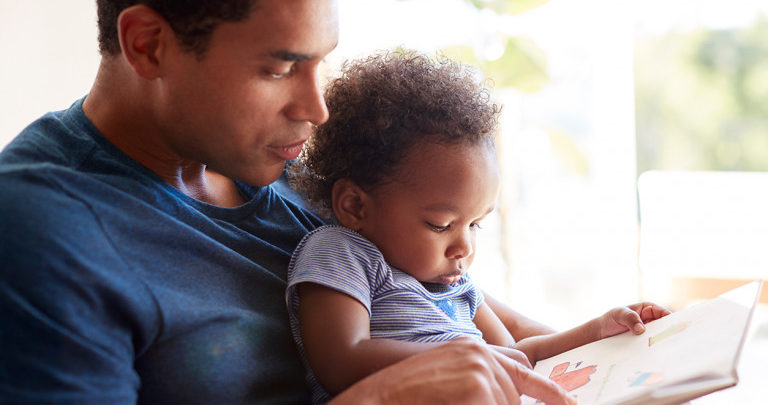Everyone knows that reading is a ‘good’ thing to do but what are the benefits of reading for babies and young children?
There are loads of studies showing that children who read a lot, or are read to frequently, will make faster progress with literacy when they are school-aged. However, school progress aside, reading and books will introduce your child to so much more than you can show in the everyday: new settings, new vocabulary, new conversational words. With this in mind, it’s good to get into the habit of reading early and to embed the practice of reading into your everyday routine.
When should I start reading to my baby?
Personally, from my experience, I think around 6 months when your baby starts to sit up, is a great time to start introducing a book into your everyday routine. By this stage, you should hopefully be in some sort of routine and have found your feet with your baby, so adding a night-time story should be a lovely addition.
Each child is so different – so please do not worry if your baby squirms, doesn’t look, is not interested. Keep up the daily practice of bringing out your book, sitting in the same spot, naming the book and then reading (for as long as you can). As with all things parenting, consistence is key!
Here are a few tips to make reading with your baby as engaging as possible:
- Don’t feel you need to read all the words. Just naming what you see on the page can be enough.
- If your child wriggles away from you, keep reading, as they will still hear the words.
- Ready slowly … rea-lly … slow-ly (yes just like that!)
- Use lots of intonation in your voice too, to make the words come to life.
- When possible, use actions to go with the words e.g. driving hands for a ‘car’, rabbit ears for a little ‘bunny’, big hands to describe ‘big’.
- Turn the pages slowly and get your baby involved with turning them too (great for development of little finger muscles).
- Can your baby sit on your partner’s lap when you read? If so, your child will be in a better position to see your face and expressions as you read. Not a problem if not though, as even if they are still sitting on your lap, they are close to you and will hear all the words, You can always turn your face towards them to emphasise more important words.
- Be consistent – read the same book/books every day. This is how your baby will learn words. Repetition is key!
Here is a list of my favourite board books for babies:
- Dear Zoo – a great book to introduce animals!
- Where’s Mr and Mrs series (from Little Nosy Crow) are a great starter book for babies. Simple, repetitive language. The felt flaps are genius (better than paper flaps as I guarantee they will eventually tear) and there’s an engaging mirror at the end.
- That’s Not My … books (from Usborne) – once again, lovely simple language for your baby, plus lots of touchy feely, sensory bits, too.
- Goodnight Moon has to be a night-time favourite for me. The illustrations are quirky, the story is quite random but the repetition of saying goodnight to so many key bedroom bits and pieces is just too cute; and it will become even cuter when your baby starts talking at 12 months +.
- The Peekaboo series (from Little Nosy Crow) – have fun little sliders for little fingers to push and the language is wonderful, simple, with lots of repetition which is what babies need.
If you need any further advice about how to introduce books and literacy to your little ones, or for more information about speech and language development in general, please feel free to contact me via my bloss profile.




Leave a Comment
You must be logged in to post a comment.